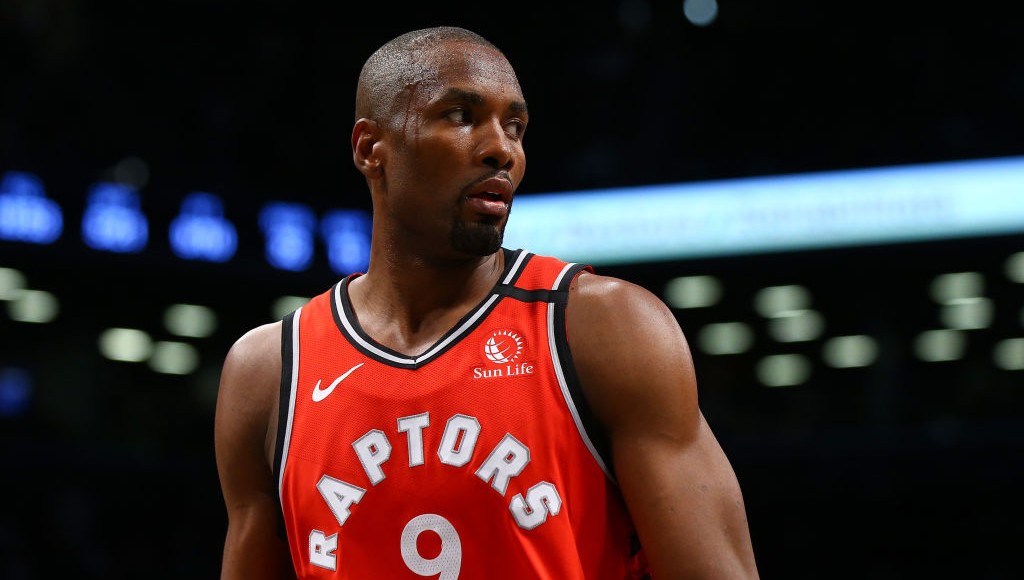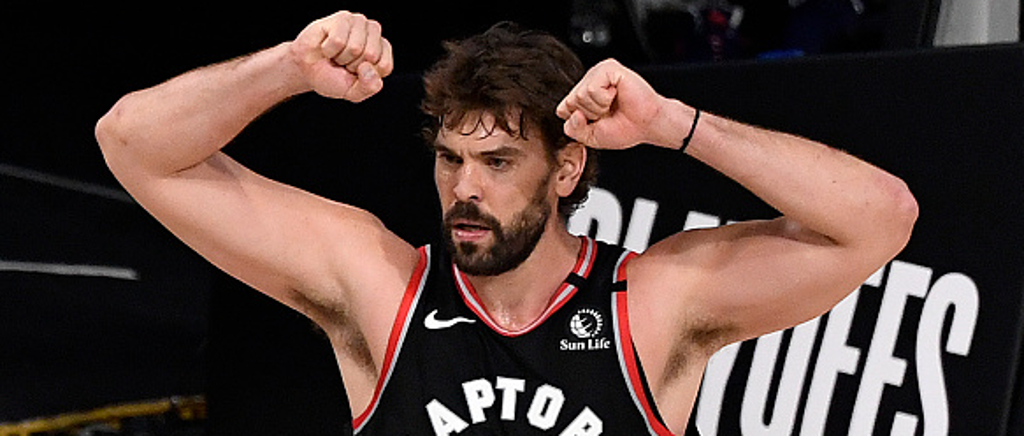Free agency ends up being a lot of things, but it’s always a clarifier. League trends, whether via prominence placed on a specific position — like this year’s big man bonanza — or playing style, can turn into a full-tilt climate of desperation wrecking seismic fallout in either conference. A team’s future gaps, little rifts barely noticeable with a roster arranged just so, turn into chasms when players walk. Even the money can tell a story — front offices that load up on players to soar past the salary cap could be looking at midseason trades, or else figure paying the penalty is a fair price for a shot at a title.
The shape of the league for seasons to come starts to emerge.
It’s strange, then, to experience a team with an identity as fixed as the Toronto Raptors existing now, weeks before the season is set to start, floating in a novel kind of limbo. One that is half created by circumstances far out of the franchise’s control in its temporary relocation to Tampa, and half by two of its biggest — in mass and popularity — players walking. The departures of Serge Ibaka to the Clippers and Marc Gasol to the Lakers, while always in the realm of possibility, still feels surprising.
Through Toronto’s lens, last season feels at once abrupt and unfinished despite the fact it was the longest in league history. The first half of the year was marred by a string of injuries that could have derailed the team at each groaning prognosis, but through roster ingenuity and a next man up approach, the Raptors were riding a thrilling and resilient season right up until its suspension. In the continuation of play at Disney, the team appeared more together than most after the months long break, but couldn’t find the necessary gear to shift into when facing Boston in the conference semifinals without the propulsion of meteoric players like Pascal Siakam or the edge of reliable minutes from the bench. The end, in the end, came so regularly after a season that felt anything but.
It was that unfinished end that made it seem reasonable, even likely, that Toronto would run it back for another season. Fred VanVleet was the team’s central target, but considerations for Ibaka and Gasol existed in close proximity. While they were each an integral part of Toronto’s on-court structure and its identity off, there may have been the sense that both would come back on shorter deals. Before the Lakers put such a premium on size by using it to their advantage in every playoff series they won in the Bubble, league demand for traditional bigs was relatively normal, if not low, and the two international veterans might have opted for less substantial deals with the Raptors. But post Lakers title, and after both the Lakers and Clippers shuffled the deck on their frontcourts in free agency, Ibaka and Gasol, on serendipitously timed expiring contracts, became two of the best options out there.
A front office can’t necessarily know it’s going to enter a perfect storm of a league-wide demand for size the same offseason it has to evaluate contracts for two championship-caliber centers, but that Toronto got caught in such a lurch could’ve gone two ways. Faced with what’s been the Raptors ultimate target of next year’s Giannis Antetokounmpo free agency, the team wasn’t willing to offer Ibaka and Gasol more than one-year deals lest those contracts make Toronto less fluid when it came time to get Antetokounmpo to the table. Alternately, after the team’s earlier than hoped for playoff exit, this coming season looked even more like the start of a rebuild year. A season to lay the groundwork for its next iteration while relying on its mainstay of defensive ingenuity to stay competitive in the East. But both options still require either Ibaka or Gasol. To lure a star like Antetokounmpo, should he become available, a team like Toronto needs to be readily on track to another title as much as it needs the cushion of cap space.

Where the Raptors sit now, en route to a strange and transitory home in Tampa, mirage-like itself against the shimmering glint of the Gulf, is in a self-induced limbo. Toronto’s front office held out for as long as it could in the hope that the Canadian government would grant it an exemption to the ongoing border closure to the States, lifting the obligatory 14-day quarantine for those entering the country and making it possible for other teams to travel to the city. How COVID cases were trending in Toronto and nationwide, when negotiations between the team and federal and municipal levels of government started, was in stark contrast to where they currently sit. It’s a factor the team couldn’t account for, but in waiting so long to make a decision, they gave up some of what has always made the Raptors appear such an assured organization.
When asked if the team had a “drop dead date” in an interview with local media on Nov. 17, GM Bobby Webster said they did not, “it’s all based on our feel on when is an appropriate amount of time to obviously let everyone know, while at the same time making a decision that is best for the franchise.”
Webster acknowledged there had been “stops and starts in different cities” but that the team didn’t want to go “on a wild goose chase” of “leading people here, then there the next day.” But by then, a week and a half away from December and training camp, whatever location was ultimately chosen for the team to start its season in was going to feel less a chase and more racing to catch up. For the first time in a long time the franchise existed in a world where it did not make its own choices, often many steps ahead. As an entity it was simply bound as a business, its stake in Toronto, the city, equalized by the virus, the same as anything else. Now, as a team, the Raptors identity hangs in a similar, ephemeral balance.
Despite both their relatively brief tenures in the scheme of a team made competitive and successful under Masai Ujiri, Ibaka’s three seasons and Gasol’s one and a half felt formative. The title imprinted them both in Raptors history but their individual contributions helped carry the team forward, growing it in ability and aspiration.
Gasol, in his steadiness and stubborn drive, became the team’s anchor. His defensive reads are as nuanced as Kyle Lowry’s sixth sense of forecasting the floor, the kind of presence that would be felt in how Toronto’s most well-honed rivals like the Sixers or Celtics would avoid making drives at the paint if Gasol stood his ground in it, silently menacing, but would flow freely through it without him. There were rare times where Gasol seemed to revel in a win but mostly he was looking ahead, concerned with how to improve.
Pre-Gasol and pre-title, Toronto was a team that could, at times, seem in a perpetual state of improving, of almost there. Through his adamant but meticulous framework, Gasol gave the team a more circumspect approach to progress. With him, the ceaseless grind gained focus. Not everything had to feel exhaustive in order to get better.
Where Gasol thrived in the team’s workmanlike approach to play, Ibaka’s strength became drawing the team away from it, freeing his teammates up to let a little of the chip roll off their shoulders. As he grew more comfortable with every season, Ibaka brought a lightness the team had lacked since its underdog days. And while he could be easy, could be mischievous off court in feeding his teammates so many shock value body parts, could be immaculate in the looks he brought to the pre-game tunnel, it was because he backed it all up on the court. Ibaka lent a bravado and swagger to the team’s sometimes systematic defensive schemes. Even his dust ups, of which there were a few in his first two seasons as a Raptor, added punctuation. He was an enforcer not completely content to rely on his size or the traditional role of his position, if not punctuating his game with the occasional challenge to a player out to try something then with elements added over time, most recently a reliable three-point shot.

The Raptors have lost not just substantial size with Ibaka and Gasol gone — physical presence picked up now by new additions Aron Baynes and Alex Len, and in resigning Chris Boucher — but close and informing pieces to team chemistry, a crucial intangible Toronto has held onto through all of its last big shakeups. With the team out of its home market, it’s going to be difficult for these new additions, plus rookies Malachi Flynn and Jalen Harris, to feel out the team’s identity by virtue of place. Even if there’d be no fans in-arena in Toronto, there’s a lot to be gained by the tactile recognition of the everyday, the osmosis of routine when taking in a new city.
There is a potential, stubborn silver lining in the team’s relocation to Tampa. With every player meeting for the first time to live, work, and compete on neutral ground, there aren’t any holdover attachments or unspoken elements of routine. It’s a completely clean slate for a team in need of reworking and reforging to cut to the heart of things, quick. The Raptors could form an identity separate from place built on the fundamental values of its core and in the process become even more internally resilient. There’s an opportunity for its next-in-line leaders of VanVleet and Siakam to step into an identity building role, catching the team’s free agency acquisitions up while instilling the kind chemistry and experience in their rookies that Lowry and DeMar DeRozan pressed on them.
If this free agency really was about setting the stage for Antetokounmpo to land in Toronto, then it behooves the Raptors to show they have the internal fortitude and framework to thrive away from home in a formative season. If the MVP is languishing in Milwaukee due to a stalling team chemistry and lack of clear plan, then Toronto would benefit by showing him they can stay competitive and revel, to a degree, in a bizarre season, no matter the backdrop.
Days after his record re-signing, VanVleet addressed Toronto media for the first time. When asked what his sense was of everything that had gone on with the roster and what it meant for Toronto’s upcoming season he said he was excited about what the team had.
“I think we’re kinda headed back in the direction of where we were pre-Kawhi [Leonard], where people are overlooking us again,” VanVleet said, “which is not a bad place to be in.”
Toronto does well out of the limelight and this season, relocated and reshuffled, some of its biggest personality pieces gone, there may not be more than passing interest to see how the north fares as transient snowbirds. After that, if the team can revert back to the kind of steadiness that got it ready to make a run at the title to begin with, will be when the work of this season starts. Without the familiarity of home court and its championship banner, a reminder trimmed in gold of who they were fluttering in the rafters, Toronto will have to look hard at a cut and condensed version of itself. If free agency’s a clarifier then its losses can be too. Free from the trappings, the belonging pin of place and those most familiar, the Raptors can decide if the way out of this lurch is along a circuitous road, eventually leading back to who and where they were, or forward, to put a stamp on something new.







